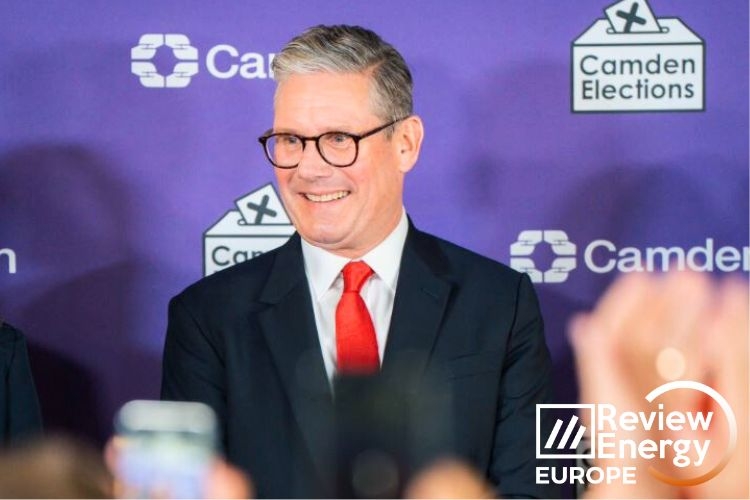
This is how Starmer plans to make Britain a clean energy superpower
After a stunning victory that shattered 14 years of Conservative Party hegemony, the left-leaning British Labour Party took over the reins of government. Incoming Prime Minister Keir Starmer pledged to help Britain "get its future back" and called for a "mandate to relight the fire" after difficult years of economic crisis and hardship.
Starmer’s administration is poised to confront the climate crisis head-on, emphasizing the potential for clean energy to spur economic growth, address the cost-of-living crisis, and restore Britain’s energy independence. Labour’s ambitious goal is to achieve a zero-carbon electricity system by 2030, highlighting a pivotal shift from the policies of the previous government.
Labour criticizes the Conservative Party for missing key opportunities in clean energy, citing a failure to link economic growth, energy security, lower bills, and climate change mitigation. They argue that the Conservative resistance to state intervention has hindered progress. This policy gap became evident when Russia’s invasion of Ukraine caused a global spike in fossil fuel prices.
Labour aims to leverage Britain's natural and technical strengths through public-private partnerships to position the nation as a clean energy leader.
In order to make Britan a clean energy superpower, these are the actions Labour Party promised during the campaign:
Clean Power by 2030
Labour aims to lower energy costs and enhance the UK’s energy security by transitioning to a zero-carbon electricity system. They plan to partner with the private sector to double onshore wind, triple solar power, and quadruple offshore wind by 2030. Investments will also target carbon capture, hydrogen, marine energy, and long-term storage, under a new Energy Independence Act.
Labour will secure the nuclear sector’s future by extending existing plants’ lifespans, completing Hinkley Point C, and prioritizing new projects like Sizewell C and Small Modular Reactors, creating thousands of jobs. They will maintain a strategic reserve of gas power stations for supply security during the transition and manage the North Sea offshore industry responsibly, banning new coal licences and permanently prohibiting fracking.
Switch on Great British Energy
Labour will establish a publicly-owned company, Great British Energy, to spearhead investment in domestic clean energy production. This company, funded with 8.3 billion pounds over the next parliament, will collaborate with industry and trade unions to drive forward clean energy projects.
Great British Energy aims to create jobs and build supply chains throughout the UK, with a focus on Scotland as the hub of this mission. Local power generation will be emphasized to reduce grid pressures, and a Local Power Plan will support thousands of clean power projects in partnership with energy companies, local authorities, and cooperatives.
Energy System Reform
Under the Conservatives, the energy market has failed consumers, with poor service and high costs. Labour will implement stricter regulations to prioritize consumer interests and attract necessary investments. The regulator will be strengthened to hold companies accountable, reduce standing charges, and ensure automatic compensation for customers affected by service failures.
The national grid's limitations have become a significant barrier to deploying clean energy and electrifying industry. Labour will work with industry to upgrade the transmission infrastructure, expediting essential business and infrastructure investments.
High-Quality Jobs
Labour's clean energy strategy aims to create high-quality jobs in collaboration with businesses and trade unions. By becoming the first major economy to transition fully to a clean-energy system, the UK can export future technologies and rebuild domestic supply chains.
The National Wealth Fund will invest in ports, hydrogen, and industrial clusters nationwide. A British Jobs Bonus will incentivize clean energy developers to offer good jobs and build supply chains in key industrial and coastal areas.
Labour also plans to address injustices in the Mineworkers’ Pension Scheme, ensuring fairer pension arrangements for those who powered the country in the past.
Warm Homes Plan
The recent energy crisis highlights the urgent need for better energy efficiency in British homes. Labour will double the existing investment to 6.6 billion pounds over the next parliament, aiming to upgrade five million homes and cut bills for families.
The Warm Homes Plan will offer grants and low-interest loans for insulation and other improvements, such as solar panels and low-carbon heating. Partnerships with local governments and the private sector will accelerate these upgrades, ensuring that private rented homes meet minimum energy efficiency standards by 2030.
Accelerating to Net Zero
High electricity costs have hindered British industry. Labour's clean energy mission will lower these costs, making British businesses more competitive. The National Wealth Fund will support the most energy-intensive sectors in their decarbonization efforts.
Labour supports a carbon border adjustment mechanism to protect British industries and meet climate goals. The institutional framework for policymaking will be adjusted to prioritize net-zero commitments, reversing the Conservative decision to limit the Bank of England's climate considerations.
The UK's financial services sector will play a crucial role in mobilizing private capital for this transition. Labour will position the UK as the global green finance leader, requiring financial institutions and major companies to develop transition plans aligned with the Paris Agreement.
Improving Resilience
Labour recognizes the need to adapt to the impacts of climate change, such as flooding and coastal erosion. The party will improve resilience across government and local authorities, working closely with emergency services to establish national standards.








Comentarios
Sé el primero en comentar...